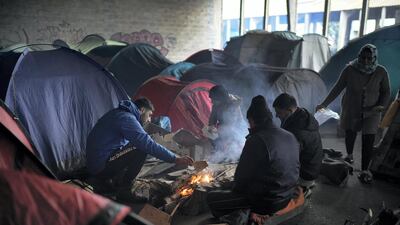Refugees could use Bitcoin’s blockchain technology to access health records and get treatment in migrant camps, health experts said.
Migrants often lack ID and medical records when they arrive at refugee camps, meaning they must be treated by doctors with no knowledge of their medical history or face the same painful examinations many times.
Displaced people also face a struggle to get a Covid-19 vaccine, partly because of the lack of data on migrant groups.
But blockchain, a form of digital ledger which can be accessed from computers around the world and is notably used as a record of Bitcoin transactions, could be adapted as a medical history logbook in order to supply the missing records.
The proposal was put forward by Paulo Rupino da Cunha and Tiago Nunes of the University of Coimbra, Portugal, in a seminar on migrant health organised by the M8 Alliance of health experts.
Mr da Cunha said medical data was often inaccessible because it was locked away in hospitals and other institutions or might have been destroyed in war.
“Even if you have the data, it is not the first thing you pack if you are running for your life,” he said.
“The lack of this information hinders health care during the journey. The medical data generated at one camp may not be available at the next camp or to humanitarian teams that refugees meet during the journey.”
In addition to lacking medical records, migrants may not have any ID at all which may prevent them from accessing health care, Mr da Cunha said.
“ID may be left behind. It is easily damaged or lost during a hard journey and a stolen ID may be of value for criminal purposes,” he said.
“The lack of a valid ID is a barrier to receiving health care even if migrants and refugees are entitled to it.”
Mr da Cunha said a blockchain medical record would be time-stamped and cryptographically locked so that the patient’s history of treatment could not be altered.
It could then be “automatically replicated anywhere”, meaning it could be accessed by health workers in any camp where migrants might find themselves.
Refugees could grant doctors access to their records with a retina or fingerprint scan, he said.
If successful, such a system would prevent migrants from having to undergo painful and expensive repeat exams, the seminar co-arranged by the London School of Hygiene and Tropical Medicine was told.
A pilot project in Jordan used blockchain to manage humanitarian aid transactions at refugee camps inhabited by Syrians.
Blockchain is best known for underpinning Bitcoin, the virtual currency founded in 2009. But other possible uses have been highlighted in recent years.
Experts last year mooted its potential use in elections as a secure way of tallying votes, meaning ballots could be cast online.
It has also been proposed as a way of storing property records, including in politically unstable countries where land ownership may be uncertain.


